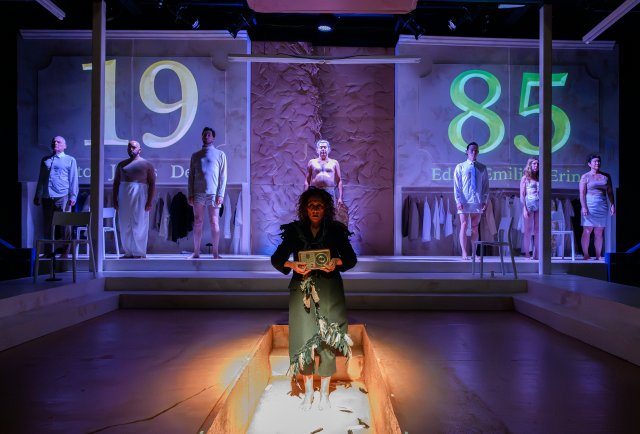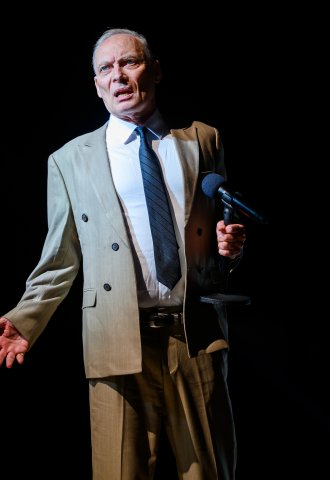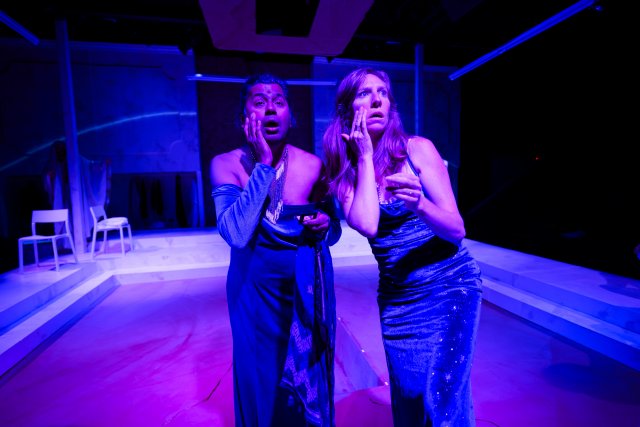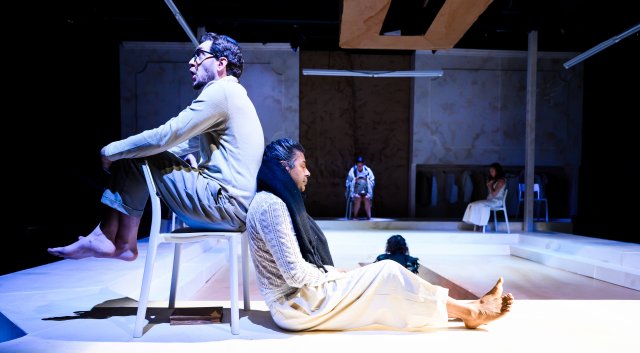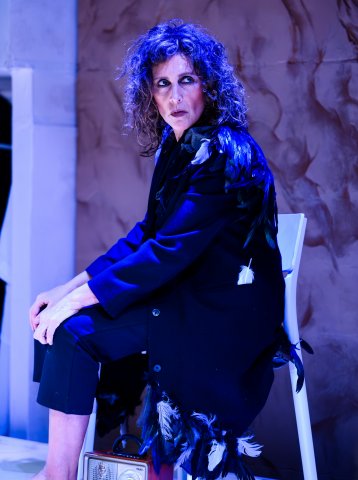Angels in America - Part 1 - Millenium Approaches
Classic Returns to Bay Area Home
By: Victor Cordell - Oct 01, 2024
Rarely does a play become a classic as soon as it reaches Broadway, but such was the case with Angels in America – Part 1 – Millenium Approaches in 1993. Receiving the Pulitzer Prize for Drama, and the Tony, Drama Desk, and NY Critics Circle Best Play Awards, its afterlife would include decorated revivals and numerous adaptations. It resonates now as it did then with its timely and thoughtful depiction of homosexuality (think of any minority as a corollary) and the AIDS epidemic (think of the Covid pandemic). Other grand social themes also receive treatment from race to religion.
Like many, having seen the HBO miniseries and the Berkeley Rep production, I felt inoculated from Angels in America but wanted to support Oakland Theater Project in this major undertaking anyway. In retrospect, no pretext required. With Michael Socrates Moran’s commanding, incisive, and brisk direction along with absolutely superlative acting across the board, this riveting production is breathtaking, and three hours whizzes by in an instant.
Angels… was born at the Eureka Theatre in San Francisco of unmatched pedigree. Playwright Tony Kushner would become one of his generation’s greatest writers. But most patrons will not realize that the plays were commissioned and shepherded by two of our greatest directors. Oscar Eustis has become the long-time Artistic Director of New York’s Public Theater, while Tony Taccone long served as Artistic Director of Berkeley Rep. And while the play takes place in New York City, San Francisco has served as Ground Zero for the topics at issue and remains its emotional heart.
Per the playwright’s stage directions in the script, the staging, by Set Designer Mark Thomas, is abstract with few props, allowing the audience to focus on the actors and to fill the scenery with their own imagination. The most symbolic aspect of the set is the pit in the center which acts as a sunken bed but anticipates a coffin. With the exception of the black-garbed angel, whitish outfits dominate the costumery against a whitish set.
Several taut but seemingly unrelated vignettes open the play, adding to the sense of disconnected abstraction. Even though the individual aspects of the play are compelling, one may wonder where they will go. Of course, the dots are eventually connected with intersections among characters, resulting in a rewarding whole.
Emotions are on edge throughout and often run high, though comic moments foreclose oppressiveness. The most gripping and chilling performance comes from Victor Talmadge who is searing as Senator Joe McCarthy’s associate Roy Cohn, a man always on the attack and physically leaning in. Perhaps his intense personification is more indelible because his is the only historical character in the play. What’s more, Cohn was a mentor to Donald Trump, which makes his self-serving, megalomania even more frightening. It is too relatable today.
Talmadge’s Cohn knows one talking speed which is fast and one volume which is loud. He is crass, domineering, and unrelenting. And it is all about him – wielding his power, no matter whether legal, and satisfying his own needs at the expense of others. But in this end-of-life period, his one obsession is his reputation - that he not be outed as gay or as inflicted with AIDS. His public insistence is that he has liver cancer, and so it is that appearance and reality fail to coincide in a world of macho and conservative hypocrisy.
The parallel concerns of love and loss in the fate of two couples actually anchor the storyline. In one, Prior, the scion of an eminent patrician family, is dying from AIDS, and his partner Louis struggles to deal with the situation. In a masterstroke of against-type casting, the director went with the best available actor, the salt-and-pepper, long-haired, Indian-ethnic, transgender J Jha in the role. Jha wails in physical and mental agony with a plaintive rasp, often crying through his speech as he gains the empathy of the audience. As implausible as this actor should seem in the role, you soon forget that and simply marvel at the fine acting.
The other couple is a Mormon pair who have had difficulty procreating and with intimacy altogether. Joe seems ambiguous and ambivalent, but his wife Harper’s pain is palpable with her agoraphobia and addiction to Valium. Unlike Prior, she should be able to control the causes of her anguish. Emilie Whelan shines as Harper, and she captures the vacant loneliness and hallucination with her flittering eyes and actions.
Kushner designed Angels… as an ensemble. Each actor gets at least one “close-up” with sizzling highlights involving hair-trigger emotion, and each deserves recognition for outstanding work. Dean Linnard plays the conflicted Louis whose urges and fears could result in betraying Prior. Likewise, the androgynous Joe, played by Edric Young confronts similar urges and fears in dealing with his marital conundrum. Lisa Ramirez is the Angel and others, while Erin Mei-Ling Stuart and James Mercer II play multiple roles, all to great effect.
This production truly excels. Even theater fans who feel that they’ve “been there, done that” and sense that the urgency of those times has passed will plumb this work with renewed appreciation.
To allow for larger audiences, Oakland Theater Project (formerly Ubuntu) has taken temporary residence at Marin Shakes’ new indoor home in San Rafael. North Bay audiences should take advantage of the opportunity to experience this fine East Bay company. The two parts are designed to work independently, but experiencing the whole sweep of the masterwork suggests seeing both if you can.
Angels in America – Part 1 – Millenium Approaches written by Tony Kushner is produced by Oakland Theater Project and plays at 514 4th Street, San Rafael, CA through October 26, 2024.

